情态动词考点易错点的总结
备战2024年高考英语考试易错点09 情态动词和虚拟语气(4大陷阱)(解析版)

易错点09情态动词和虚拟语气目录01易错陷阱(4大陷阱)02举一反三【易错点提醒一】情态动词基本用法易混易错点【易错点提醒二】情态动词表判断推测易混易错点【易错点提醒三】情态动词后+have done易混易错点【易错点提醒四】虚拟语气易混易错点03易错题通关易错陷阱1:情态动词基本用法易混易错点。
【分析】功能:情态动词不能单独作谓语,后跟动词原形共同构成谓语。
形式:情态动词没有人称和数的变化。
否定形式是多数情态动词的否定式是在情态动词的后面加not。
时态:个别情态动词有现在式和过去式两种形式,过去式用来表达更加客气、委婉的语气。
位置:情态动词在谓语之前;谓语动词前若有助动词,则在助动词之前。
疑问句中在主语之前。
【高频考点】1.can/could表能力、请求、可能性(表示可能性用于否定句及疑问句中);特殊句型:can not...too.../enough(再怎么……也不过分)、can't help but do sth.(不得不做某事)、can't wait to do sth.(迫不及待地做某事)。
2.may/might表较小的可能性;表示请求许可以及祝愿。
句型和搭配:may/might as well do表示“还是……好;最好……”;may well do表示“很可能”;may可以用来表示祝愿,用“may+主语+动词原形”结构。
May you succeed.祝你成功。
3.must表示非常肯定的推测;表“偏要;非要……不可”;mustn't意为“禁止”,表示“不必”应用needn't。
4.shall的用法用于第二、三人称的陈述句中,表命令、警告、许诺或威胁等,语气强于should;用于第一、三人称的疑问句中,表示征询意见。
5.should/ought toshould表责任、义务、劝告、建议等,意为“应该”,还可表出乎意料的语气,意为“竟然”;ought to表义务或责任,意为“应该”。
【英语】情态动词考点易错点的总结
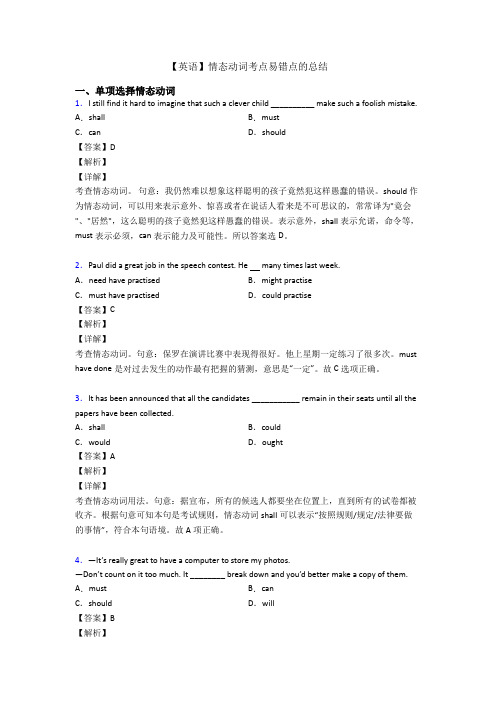
【英语】情态动词考点易错点的总结一、单项选择情态动词1.I still find it hard to imagine that such a clever child __________ make such a foolish mistake. A.shall B.mustC.can D.should【答案】D【解析】【详解】考查情态动词。
句意:我仍然难以想象这样聪明的孩子竟然犯这样愚蠢的错误。
should 作为情态动词,可以用来表示意外、惊喜或者在说话人看来是不可思议的,常常译为"竟会"、"居然",这么聪明的孩子竟然犯这样愚蠢的错误。
表示意外,shall表示允诺,命令等,must表示必须,can表示能力及可能性。
所以答案选D。
2.Paul did a great job in the speech contest. He many times last week.A.need have practised B.might practiseC.must have practised D.could practise【答案】C【解析】【详解】考查情态动词。
句意:保罗在演讲比赛中表现得很好。
他上星期一定练习了很多次。
must have done是对过去发生的动作最有把握的猜测,意思是“一定”。
故C选项正确。
3.It has been announced that all the candidates ___________ remain in their seats until all the papers have been collected.A.shall B.couldC.would D.ought【答案】A【解析】【详解】考查情态动词用法。
句意:据宣布,所有的候选人都要坐在位置上,直到所有的试卷都被收齐。
根据句意可知本句是考试规则,情态动词shall可以表示“按照规则/规定/法律要做的事情”,符合本句语境。
(完整版)情态动词中考重难点及易错点

Part 4 【语法】の情态动词重难点及易错点情态动词+动词原形情态动词表允许及其回答情态动词表猜测【情态动词表允许】1、请求允许做某事时,can最常用,在没有把握或为表现得更客气一些时,可用could;而may比can 更正式一些,且多用于第一人称Could I watch TV?Can you find a seat for me?May I use your phone?2、当允许某人做某事时,要用can和may,不用could 和might.Could I borrow your computer? Yes, of course you can.Might I trouble you for a light? Yes, you may.3、常考易错点:对情态动词表请求的回答:肯定:Sure. 否定:You’d better not.Certainly. I’m afraid not.Yes, do please. I’m sorry, but you can’t/mustn’t.No problem.That’s OK/all right.Yes, you can/may.With pleasure.4、例:May I smoke here? Sorry, but you mustn’tMust I go home before 8 o’clock?No, you needn’t/don’t have to .Need I go? Yes, you must. / No, you needn’t.Would you mind.... if I smoke here? Yes, you’d better no t. / No, of course not.【情态动词表猜测】肯定:must >can>may否定:can’t > may not一定是;肯定是________; 可能是________;一定不是;不可能是________; 可能不是________;【针对练习】( ) 1. "________ I take it out?" "I'm sorry, you ________."A. Could ...couldn'tB. Might...might notC. Could ...canD. May...can't ( ) 2. "Need we do this job now?" "Yes, ________."A. you needB. you shouldC. you mustD. you can( ) 3. He said that you ________ watch TV all the evening if you wished.A. mayB. mustC. canD. might( ) 4. Peter ________ come with us tonight, but he isn't very sure yet.A. mustB. canC. mayD. will( ) 5. Michael ________ be a policeman, for he's much too short.A. needn'tB. can'tC. shouldn'tD. won't( ) 6. Come on! We ________ hurry because there isn't much time left.A. mayB. mustC. canD. need( ) 7. ---Do you mind if I turn on the TV?---________. My father is sleeping.A. Better not.B. No, not at all.C. No, I don’t mind.D. That’s all right. ( ) 8. ---Would you mind my sitting next to you?---________.A. No, of course not.B. No, you can’t.C. Yes, please.D. Yes, go ahead. ( ) 9. ---Would you please pass me today’s paper?---________.A. Yes, please.B. Here you are.C. You are welcome.D. I think so. ( ) 10. ---"Could I call you by your first name?"---"Yes, you________."A. willB. couldC. mayD. might( ) 11. I wasn't sure whether I ________offer to help or not.A. shouldB. mightC. wouldD. needed ( ) 11. There ________ too much noise in a hospital.A. should haveB. shouldn't haveC. ought to beD. oughtn't to be( ) 12. Albert is too fat. She ________ eat too much sweet.A. had better notB. shouldC. ought toD. ought to not ( ) 13. --- ________ they better wait here, sir?---No, they ________.A. Do; don'tB. Had; hadn'tC. Had; don'tD. Had; had ( ) 14.--Excuse me, sir! Can I finish my homework tomorrow morning?--- Oh, no. It ________ be finished tonight,A. wouldB. shouldC. couldD. can( ) 15.You had better________ your job on timeA. finishingB.to finishC. finishD. finished BABBC【巩固练习】( ) 12. -Is John coming by train?--He should, but he ________ not. He likes driving his car.A. mustB. canC. needD. may( ) 13. I thought you ________ be hungry, so I have brought you some cakes.A. mayB. mightC. canD. could( ) 14. ---Could you please help me choose an MP4 player online?---________. My computer doesn’t work.A. I don’t care.B. I hope so.C. I’m afraid not.( ) 15. ---Would you mind if I sit here?---________. It’s for Miss Zhang.A. Better not.B. Never mind.C. Not at all.D. Of course not.( ) 16. You ________walk for miles and miles among the hills without meeting anyone if you go there.A. mustB. needC. mayD. should DCDDC BBBAC AABCCA【中考链接】( ) 1. To keep children safe, we ___________ put the things like knives and medicine away in our house. (2017广东中考)A. mayB. shouldC. canD. might( ) 2. ---Mum, ____ I visit the Modern Art Museum next Monday? (2016广东中考) ---I’m afraid you can’t. All the museums in this city are closed on Monday.A. wouldB. needC. shouldD. may( ) 3. --- ________ I hand in the report today? (2017北京中考)--- No, you needn’t.A. CanB. MustC. ShallD. Could( ) 4. ---________ I park my car here for a while? (2017上海中考)---No, you mustn’t. Do you see the sign“NO PARKING”?A. WouldB. MayC. MustD. Should( ) 5. ---Must I prepare for the trip today? (2017哈尔滨中考)--- No, you _________ prepare for it today. You can do it tomorrow.A. needB. don’t needC. needn't( ) 6. ---Many people play with mobile phones all day instead of reading books.---That’s too bad. Everyone ________ be a book lover. Reading is more enjoyable. (2016山西中考)A. mayB. shouldC. would( ) 7. ---Mum, ________I play football this afternoon? (2016天津中考) ---Sure, but you ________ finish your homework first.A. may; couldB. can; mustC. can; mustn’tD. may; can’t。
语法情态动词的常见错误分析

语法情态动词的常见错误分析语法情态动词在英语写作中起到了重要的作用,它能够表达说话者的意愿、推测、可能性等信息。
然而,由于语法情态动词的特殊性,很容易出现错误使用的情况。
本文将分析一些常见的语法情态动词错误,并提供相应的纠正措施,以帮助读者更好地运用这些动词。
1.情态动词与动词不一致情态动词后面的动词应该使用原形,不加“-s”结尾。
然而,在写作中常常出现情态动词与动词不一致的情况。
例如:- 错误:She musts study hard for the exam.- 正确:She must study hard for the exam.纠正该错误的方法是注意情态动词后面使用动词的原形,不要加任何后缀。
2.情态动词与助动词混淆有些情态动词在使用时容易与助动词混淆。
例如,“have to”是常用的情态动词,表示“必须”,而“have been”是助动词,表示“已经”。
然而,在实际写作中,很容易将两者混淆。
例如:- 错误:I have to been to New York last year.- 正确:I have been to New York last year.纠正该错误的方法是仔细区分情态动词与助动词的用法,注意上下文提供的时间信息。
3.情态动词的时态错误除了与助动词混淆外,情态动词的时态也容易被错误使用。
一般情况下,情态动词本身不具备时态,而是通过后面的动词来表示。
例如:- 错误:She will can help you with the project.- 正确:She will be able to help you with the project.纠正该错误的方法是注意情态动词本身不受时态的影响,根据上下文选择合适的动词来表示时态。
4.情态动词的双重否定情态动词在表达否定意义时,不能与其他否定词连用,否则会产生双重否定的错误。
例如:- 错误:I don't have no time to go shopping.- 正确:I don't have any time to go shopping.纠正该错误的方法是注意情态动词本身已经包含否定意义,不需要再加其他否定词。
人教版七年级下册英语之情态动词的常见错误
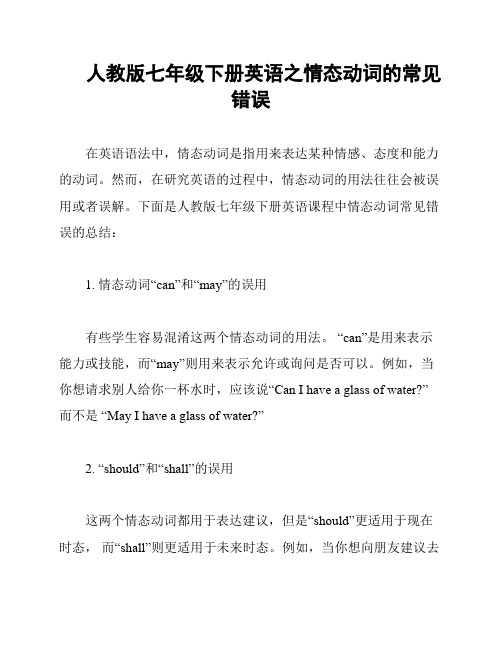
人教版七年级下册英语之情态动词的常见
错误
在英语语法中,情态动词是指用来表达某种情感、态度和能力的动词。
然而,在研究英语的过程中,情态动词的用法往往会被误用或者误解。
下面是人教版七年级下册英语课程中情态动词常见错误的总结:
1. 情态动词“can”和“may”的误用
有些学生容易混淆这两个情态动词的用法。
“can”是用来表示能力或技能,而“may”则用来表示允许或询问是否可以。
例如,当你想请求别人给你一杯水时,应该说“Can I have a glass of water?” 而不是“May I have a glass of water?”
2. “should”和“shall”的误用
这两个情态动词都用于表达建议,但是“should”更适用于现在时态,而“shall”则更适用于未来时态。
例如,当你想向朋友建议去
看一场电影时,应该说“we should go to see a movie”而不是“we shall go to see a movie”
3.动词用法问题
有些情态动词有一些固定的动词短语。
例如,“had better”和“would rather” 通常会后接以“not”开头的动词。
例如,我们应该说“had better not go ”而不是“had better don't go”
以上是人教版七年级下册英语课程中情态动词常见的误用,希望同学们可以注意这些错误,提高自己的英语语法水平。
中考英语知识点 情态动词10大易错点.doc

中考英语知识点情态动词10大易错点情态动词表一定的词义,本身并不表示动作或状态,而仅仅表达说话人的态度,它在句中须和主要动词一起构成谓语,主要的情态动词有can(could), may (might), must, have to, ought to, need, dare, shall, should, will, would.1、can能,可以,表说话人同意,许可,还可表客观条件许可,如:You can go now.你可以走了。
(1) 提建议或请求时可用can I, can you表客气,如Can I buy you a drink? 我能为你买份饮料吗?(2) can表一般具有的能力,be able to表在特定条件下的能力,如:Although the driver was badly hurt, he was able to explain what had happened. 尽管司机伤的很严重,他仍然能够解释发生了什么。
(3) can表猜测时,一般带有惊讶怀疑的语气,如: Can this be Mr. smith? 这会是史密斯先生吗?2、may(1)可以,表说话人同意,许可或请求对方许可。
You may go. 你可以走了(2)(现在和将来)可能,也许,只用于肯定句和否定句中,如He may not be right. 他可能不是对的.(3)can not与may not, can not表示不可能, may not表示可能不3、must, have tomust表主观上的必须,have to表客观上的必须,如:It’s getting late. I have to go. 太晚了,我不得不走。
Must I go now. -Yes, you must. 我现在必须得走了。
是的,你必须。
(No, you needn’t./ No, you don’t have to.) 不,你没必要。
高中英语高考语法易错知识点10.情态动词(考点梳理+易错点)
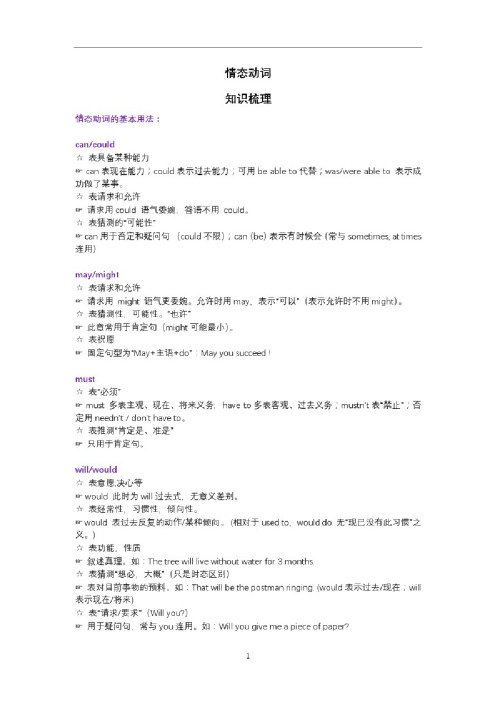
情态动词知识梳理情态动词的基本用法:can/could*表具备某种能力叱can表现在能力;could表示过去能力;可用be able to代替;was/were able to表示成功做了某事。
*表请求和允许叱请求用could语气委婉,答语不用couldo*表猜测的•可能性"吐can用于否定和疑问句(could不限);can(be)表示有时候会(常与sometimes,at times 连用)may/might*表请求和允许计请求用might语气更委婉:,允许时用may,表示•可以11(表示允许时不用might)。
六表猜测性,可能性。
"也许"叱此意常用于肯定句(might可能最小)。
六表祝愿吐固定句型为"May+主语+d。
":May you succeed!must*表“必须"wmust多表主观、现在、将来义务;have to多表客观、过去义务;mustrYt表噤止”;否定用needn't/don't have to。
介表推测。
肯定是、准是.吐只用于肯定句。
will/would六表意愿,决心等w would此时为will过去式,无意义差别。
六表经常性,习惯性,倾向性。
叱would表过去反复的动作/某种倾向。
(相对于used to,would do无"现已没有此习惯”之义。
)*表功能.性质叱叙述真理,如:The tree will live without water for3months.女表猜测11想必,大概•(只是时态区别)吐表对目前事物的预料。
如:That will be the postman ringing(would表示过去/现在;will 表示现在/将来)六表“请求/要求-(Will yoiP)用于疑问句,常与you连用。
如:Will you give me a piece of paper9shall(否:shan't)六表征求意见•…好不好.*用在第一、三人称°如:Shall the reporters wait outside or what9六表允诺、威胁、警告、命令或根据规定有义务做吐用于第二、第三人称。
完整版情态动词总结以及易错点
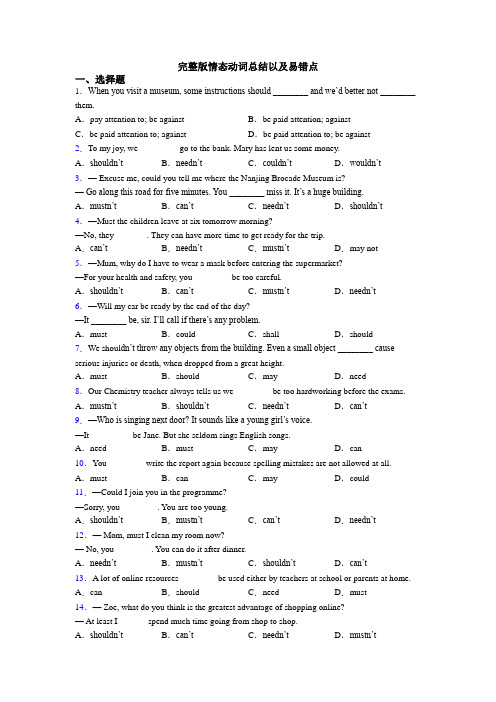
完整版情态动词总结以及易错点一、选择题1.When you visit a museum, some instructions should ________ and we’d better not ________ them.A.pay attention to; be against B.be paid attention; againstC.be paid attention to; against D.be paid attention to; be against2.To my joy, we_________ go to the bank. Mary has lent us some money.A.shouldn’t B.needn’t C.couldn’t D.wouldn’t3.— Excuse me, could you tell me where the Nanjing Brocade Museum is?—Go along this road for five minutes. You ________ miss it. It’s a huge building. A.mustn’t B.can’t C.needn’t D.shouldn’t 4.—Must the children leave at six tomorrow morning?—No, they _______. They can have more time to get ready for the trip.A.can’t B.needn’t C.mustn’t D.may not 5.—Mum, why do I have to wear a mask before entering the supermarket?—For your health and safety, you ________ be too careful.A.shouldn’t B.can’t C.mustn’t D.needn’t 6.—Will my car be ready by the end of the day?—It ________ be, sir. I’ll call if there’s any problem.A.must B.could C.shall D.should7.We shoul dn’t throw any objects from the building. Even a small object ________ cause serious injuries or death, when dropped from a great height.A.must B.should C.may D.need8.Our Chemistry teacher always tells us we ________ be too hardworking before the exams. A.mustn’t B.shouldn’t C.needn’t D.can’t9.—Who is singing next door? It sounds like a young girl’s voice.—It _________ be Jane. But she seldom sings English songs.A.need B.must C.may D.can10.You ________ write the report again because spelling mistakes are not allowed at all. A.must B.can C.may D.could 11.—Could I join you in the programme?—Sorry, you ________. You are too young.A.shouldn’t B.mustn’t C.can’t D.needn’t12.— Mom, must I clean my room now?— No, you ________. You can do it after dinner.A.needn’t B.mustn’t C.shouldn’t D.can’t13.A lot of online resources ________ be used either by teachers at school or parents at home. A.can B.should C.need D.must14.— Zoe, what do you think is the greatest advantage of shopping online?— At least I ______ spend much time going from shop to shop.A.shouldn’t B.can’t C.needn’t D.mustn’t15.—The high school entrance examination is coming!—Yes, our teacher tells us we _______ be too careful while taking exams.A.mustn't B.shouldn't C.needn't D.can't16.We’ve discussed every detail of this plan and have got everything ready. But still something __________ go wrong. We still have to be very careful.A.must B.should C.would D.may17.When I was young, my father ___________ take me to climb the hill which was not far from our house.A.may B.must C.would D.should 18.—Would you please________in that way? That’s not safe!—Sorry. I won’t do it any more.A.not driving B.not to drive C.no driving D.not drive 19.—Ready? Let’s get started, Martin.— Swimming? I just ________ get used to it in winter.A.can’t B.needn’t C.mustn’t D.shouldn’t 20.—Dad, must we wait until the light becomes green?—Yes, I am afraid we ________. That’s the traffic rule.A.may B.can C.have to D.need21.—How beautiful the winter jasmines (迎春花) are!—Yes. These golden-yellow flowers ________ be widely seen in my city in March.A.must B.can C.would D.should22.We've discussed every detail of this plan and have got everything ready. But still something ________ go wrong. We still have to be very careful.A.must B.should C.would D.may23.— Mum, why do I have to wash hands so many times a day?—You ________ be too careful, for your health.A.can’t B.mustn’t C.may not D.needn’t24.—In China, many parents complain that their children have to stay up late to do the homework.—Don’t worry. The government has realized the problem. I’m sure there ________ be good news soon.A.can B.should C.need D.must25.—Will dad arrive home at 6 o’clock to have dinner with us this evening?— I think he will, but he ________ not. Sometimes he works extra hours.A.can B.must C.need D.may 26.—Seventy dollars for such a dress! You ________ be joking!—I’m serious. It’s made of silk from Hangzhou.A.must B.need C.will D.can27.Look at the floor, Tom! ________ you watch TV while having a meal?A.Should B.Could C.Must D.May28.—Excuse me. I haven’t finished reading the book yet. May I keep it a bit longer?— Sorry, you ________. You must return it on time.A.needn’t B.can’t C.won’t D.shouldn’t 29.—How do you like my new dress?—Well, if I ________ say, it is not suitable for you.A.may B.must C.have to D.should30.For the safety of the passengers, objects like guns ________ be carried on board.A.may not B.needn’t C.might not D.mustn’t 31.—What is that young lady’s job?— She ________ be a nurse, I’m not sure.A.must B.may C.need D.would32.—In China, many students have to stay up late to do their homework.—No worries. The government has realized the problem. I’m sure there ________ be good news soon.A.can B.should C.must D.need33.—May I have some wine to drink?—No, you ________. You have to drive home later.A.mustn’t B.needn’t C.can’t D.may not34.You ________ drive after drinking alcohol(酒). It’s against the law.A.mustn’t B.needn’t C.couldn’t D.wouldn’t35.—I think they are enough. We ________ make so many chairs.—I don’t think so. Because nearly a quarter of them need ________.A.don’t need to; mending B.needed; to be mendedC.don’t need; mend D.need; to mend36.You ________ be careful with the camera. It costs!A.can B.will C.should D.may 37.—Who’s singing next door? Is it Miss Wang?—It ________ be her. She’s having the board meeting.A.can’t B.shouldn’t C.mustn’t D.needn’t38.—Do we have to finish this today?—Yes, you ________ . Today is the last day.A.would B.may C.can D.must39.Sorry, smoking is not allowed here. If you ________ , you will be fined according to the rules. A.can B.will C.may D.must40.Mr. Black ________ be at home now. He went abroad on vacation last Friday.A.can’t B.mustn’t C.needn’t D.shouldn’t【参考答案】一、选择题1.D解析:D句意:当你参观博物馆时,应该注意一些说明,我们最好不违反它们。
高考情态动词考点易错点的总结

高考情态动词考点易错点的总结一、单项选择情态动词1.What a pity! Considering his ability and experience, he ___________ it better.A.need have done B.must have doneC.can have done D.might have done【答案】D【解析】【详解】考查虚拟语气中的情态动词。
句意:真遗憾啊!考虑到他的能力和经验,他也许可以做得更好。
can have done较少使用此结构,表示对过去行为的怀疑;用于疑问句时意为“难道真的做了吗”,表示怀疑;need have done需要做某事,实际上却未做(表示虚拟语气);must have done一定做了某事(表示对过去发生的事情的肯定推测);might have done表示对发生过的事情的推测,意思是“可能已经”或“也许已经”,用于肯定句中。
故D正确。
【点睛】本题是高考必考考点,一定要牢记句型意思。
must have done过去肯定做了某事。
should have done本应该做而实际未做。
can’t have done过去不可能做了某事;shouldn’t have done 本不应该做而实际做了。
need have done本有必要做某事而没做;needn’t have done本没有必要做某事;注意没有mustn’t have done的形式。
2.--- Oh, my God! I just missed the last bus back home.--- That’s really bad. I’m sure you ______ it, but you just didn’t hurry up.A.had caught B.could have caught C.could catch D.can catch【答案】B【解析】【详解】考查情态动词+have done结构。
情态动词的难点及易错易混知识点提炼

第十二讲:情态动词的难点及易错易混知识点提炼教学重点:掌握情态动词的难点及易错易混的知识点,达到对这一知识点的融会贯通。
教学内容:分析情态动词的难点及易错易混知识点,通过例题比较,达到对这一知识点的彻底理解。
难点及易错易混知识点分析:(一)情态动词的类型:1.只作情态动词用的有:must, can(could), may(might), ought to;2.可作情态动词也可作实义动词的有:need, dare(美语中常用作实义动词);3.可作情态动词也可作助动词的有:shall(should), will(would);4.具有情态动词的某些特征的有:have (had) to, used to。
(二)情态动词的特征1.有一定的词义,但不能单独作谓语,他们要和行为动词或连系动词连用,构成谓语。
2.适用于主语的各种人称和数(have to例外,主语是第三人称单数时,要用has to)We (He) must work hard.我们(他)一定要努力工作。
I have to walk home.我得步行回家。
He has to walk home.他得步行回家。
3.后面接原形动词,即不带to的不定式(ought to, have to, used to本身带有to)。
He may lose his way.他可能迷路。
You ought to obey the law. 你要遵守法律。
4.具有助动词的作用,即可用来构成否定句、疑问句及用于简明答语。
-----I can’t swim. Can you swim?-----No, I can’t, either.(三)情态动词的用法难点(1)can/could既可表能力(ability),又可表可能性(possibility),(一般指客观可能性)。
(2)may只能表示“可能性”,不能表示“能力”。
(3)be able to 只能表能力;could只能表示过去一般性的能力,而was/were able to + 特定行为,则表示的确做成了某事,相当于managed to do sth,was/were successful in doing sht.,succeeded in doing sth.;表示将来才具备的能力只能用shall/will be able to。
小学六年知识点归纳情态动词的常见错误与纠正

小学六年知识点归纳情态动词的常见错误与纠正情态动词是英语语法中一个重要的概念,它在表达说话者的态度、欲望、推测等方面起到了关键作用。
然而,由于它的特殊性,学生在运用情态动词时常常容易出现错误。
本文将归纳小学六年级学生在使用情态动词时常见的错误,并提供相应的纠正方法。
一、使用情态动词的时态错误情态动词本身是没有时态的,它们不会随着主语的变化而变化。
因此,学生在使用情态动词时常常犯如下错误:1. 错误:他一定会帮助我。
纠正:他一定可以帮助我。
2. 错误:我要去看电影。
纠正:我想去看电影。
3. 错误:他可能会迟到。
纠正:他可能迟到。
在上述例子中,情态动词“会”、“要”、“可能”并不需要加上助动词“will”、“shall”、“can”来表示将来、必须或能力等。
正确的用法应该是省略助动词。
二、情态动词在肯定句和否定句中的错误用法情态动词在肯定句和否定句中的用法不同,学生常常无法正确处理这种用法的差异。
以下是一些常见的错误:1. 错误:我能不能参加你的生日派对?纠正:我可以参加你的生日派对吗?2. 错误:他不会不同意我们的计划。
纠正:他会同意我们的计划。
在这些例子中,学生常常误以为在否定句中,情态动词后面还需要加上否定词“not”。
实际上,在否定句中,情态动词本身已经表达了否定的意思,不再需要加上额外的否定词。
三、情态动词的语序错误情态动词的语序也是学生容易犯错的地方。
以下是一些常见的错误:1. 错误:你能请帮我一个忙吗?纠正:你能帮我一个忙吗?2. 错误:你可以帮我吗请?纠正:你可以帮我吗?在这些例子中,学生常常倒置了情态动词和动词的顺序。
正确的用法应该是将情态动词放在动词前面,不需要重复使用谓语动词。
四、情态动词在虚拟语气中的错误用法情态动词在虚拟语气中有一些特殊的用法,学生常常混淆这些用法。
以下是一些常见的错误:1. 错误:如果我是你,我应该不会同意。
纠正:如果我是你,我可能不会同意。
2. 错误:他应该马上给我打电话。
人教版七年级下册英语之情态动词的常见错误
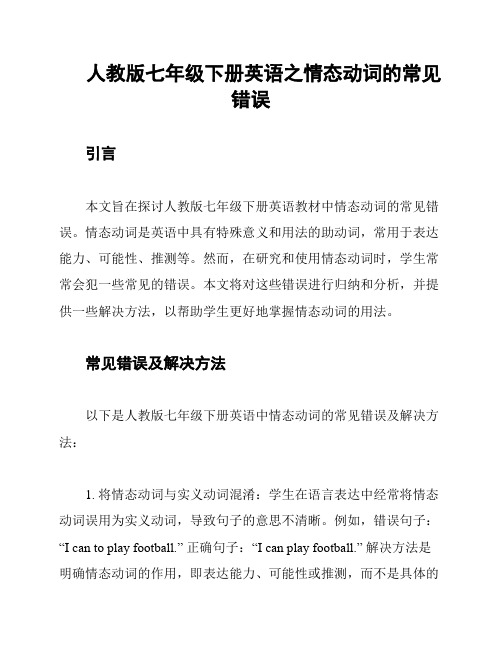
人教版七年级下册英语之情态动词的常见错误引言本文旨在探讨人教版七年级下册英语教材中情态动词的常见错误。
情态动词是英语中具有特殊意义和用法的助动词,常用于表达能力、可能性、推测等。
然而,在研究和使用情态动词时,学生常常会犯一些常见的错误。
本文将对这些错误进行归纳和分析,并提供一些解决方法,以帮助学生更好地掌握情态动词的用法。
常见错误及解决方法以下是人教版七年级下册英语中情态动词的常见错误及解决方法:1. 将情态动词与实义动词混淆:学生在语言表达中经常将情态动词误用为实义动词,导致句子的意思不清晰。
例如,错误句子:“I can to play football.” 正确句子:“I can play football.” 解决方法是明确情态动词的作用,即表达能力、可能性或推测,而不是具体的动作或状态。
将情态动词与实义动词混淆:学生在语言表达中经常将情态动词误用为实义动词,导致句子的意思不清晰。
例如,错误句子:“I can to play football.” 正确句子:“I can play football.” 解决方法是明确情态动词的作用,即表达能力、可能性或推测,而不是具体的动作或状态。
2. 错误使用情态动词的否定形式:学生有时会错误地将情态动词的否定形式放在动词前面,而不是在情态动词本身之后。
例如,错误句子:“I must not to go to school.” 正确句子:“I must not go to school.” 解决方法是学生应该牢记情态动词的否定形式是在情态动词本身之后,而不是在后面的动词之前。
错误使用情态动词的否定形式:学生有时会错误地将情态动词的否定形式放在动词前面,而不是在情态动词本身之后。
例如,错误句子:“I must not to go to school.” 正确句子:“I must not go to school.” 解决方法是学生应该牢记情态动词的否定形式是在情态动词本身之后,而不是在后面的动词之前。
情态动词考点易错点的总结

情态动词考点易错点的总结一、单项选择情态动词1. ---Is Jack on duty today?---It ________ be him. It's his turn tomorrow.A.mustn't B.won't C.can't D.needn't【答案】C【解析】【详解】考查情态动词表示推测。
句意:--今天杰克值日吗?--不可能是他。
明天该轮到他。
can’t be 用于否定推测“不可能是”,must表示推测的时候,表示“肯定是”,won’t不愿意,needn’t 不必,故选C。
2.—I don’t really like Janes. Why did you invite him?—Don’t worry. He come. He said he was’t certain what his plans were.A.must not B.need not C.would not D.might not【答案】D【解析】考察情态动词,题干中的he wasn’t certain说明他可能不来,可能来,因此使用不完全否定,might not。
3.They were abroad during the months when we were carrying out the investigation, or they __________to our help.A.would have come B.could comeC.have come D.had come【答案】A【解析】试题分析:本句考查的是一个含蓄的虚拟条件句,句中的or相当于if they had not gone abroad.因为前面句中使用的是were,说明这个虚拟语气是与过去事实相反,所以主句中使用的是“情态动词+have done”的形式。
句意:当我们在做调查的那几个月里,他们一直在国外,否则的话他们早就来帮助我们了。
精品情态动词考点易错点的总结

精品情态动词考点易错点的总结一、选择题1.The boy is very brave.I ________ he ________ the tall tree.A.dare say; dares to climbB.dare to say; dare climbingC.dare saying; dares climbD.dare to say; dares climbed2.Think twice before making a decision, or you __________ get into trouble.A.may B.can't C.shouldn't D.mustn't 3.—Will my car be ready by the end of the day?—It ________ be, sir. I’ll call if there’s any problem.A.must B.could C.shall D.should4.Our Chemistry teacher always tells us we ________ be too hardworking before the exams. A.mustn’t B.shouldn’t C.needn’t D.can’t 5.Exercise is helpful but it ________ be regular (规律的) exercise.A.must B.may C.can D.need6.You'd better __________ hard from now on, __________ you will fail the exam. A.work; and B.working; or C.working; and D.work; or7.— Mom, must I clean my room now?— No, you ________. You can do it after dinner.A.needn’t B.mustn’t C.shouldn’t D.can’t8.A lot of online resources ________ be used either by teachers at school or parents at home. A.can B.should C.need D.must9.—Why didn’t you tell it to me earlier?— Why ________ I? I want to have my own secret.A.can B.may C.should D.shall 10.Please don't make so much noise. I ________ hear the speaker very well.A.needn't B.can't C.shouldn't D.mustn't11.You ________ require others to do with the problem like you. Everyone has his own way. A.mustn’t B.needn’t C.may not D.shouldn’t12.---Will you be back early this evening?---Yes, but I ________ be a little late. Our boss sometimes has extra work for us.A.may B.must C.need D.will13.We’ve discussed every detail of this plan and have got everything ready. But still something __________ go wrong. We still have to be very careful.A.must B.should C.would D.may14.You ______ pay too much attention to your pronunciation, as it is so important in the oral (口头的) test.A.shouldn’t B.mustn’t C.can’t D.needn’t 15.—Shall we go camping this summer holiday?—Nothing________be better.A.should B.could C.must D.may16.My bike was broken yesterday,so I____walk home.A.might B.had to C.must D.could 17.—Would you please________in that way? That’s not safe!—Sorry. I won’t do it any more.A.not driving B.not to drive C.no driving D.not drive 18.Dr. Zhong Nanshan once said, "To prevent the spread of this disease, we________never be too careful."A.can B.may C.must D.should 19.—Will your mother be at home this Saturday?—Hard to say. She _______go to the countryside to see my grandparents.A.must B.may C.can D.would 20.—Have you decided to take up teaching as career after graduation?—I ________ go abroad for further education instead. But it depends.A.must B.should C.may D.shall21.For the safety of the passengers, objects like guns ________ be carried on board.A.may not B.needn’t C.might not D.mustn’t 22.—Must I finish all my homework today, Mum?—No, you ________, my dear. You can finish some tomorrow if you like.A.needn’t B.shouldn’t C.can’t D.mustn’t23.We've discussed every detail of this plan and have got everything ready. But still something ________ go wrong. We still have to be very careful.A.must B.should C.would D.may 24.—Suzy described every detail of the accident just now.—Her memory ________ be completely back.A.shall B.need C.must D.could25.I think all the students love the weekends because, to them, they ________ get up early on Saturdays or Sundays.A.mustn’t B.don’t need C.needn’t D.can’t 26.—Will dad arrive home at 6 o’clock to have dinner with us this evening?— I think he will, but he ________ not. Sometimes he works extra hours.A.can B.must C.need D.may27.Cars ________ give way to walkers on some roads in Binhai, or the drivers will be fined. A.may B.will C.can D.must 28.Sometimes smiles ________ be false, hiding other feelings like anger, fear or worry. A.should B.would C.must D.can 29.—Hurry up, Jack! Let’s cross the road as fast as possible.—No, you ________. Don’t you see the light is still red?A.couldn’t B.wouldn’t C.mustn’t D.needn’t30.— The sandstorm in Beijing is so serious this year.— Yes, I wonder when we ________ worry about the air we breathe.A.can’t B.mustn’t C.needn’t D.shouldn’t31.A hard-working man ________ become a great scientist, but a great scientist ________ be a hard-working man.A.can’t; can B.may not; must C.can’t; must D.may not; can 32.—How beautiful the winter jasmines (迎春花) are!—Yes. These golden-yellow flowers ________ be widely seen in my city in March.A.must B.can C.would D.should33.— What do you think of the show yesterday?— Some of them were really good but others ________ be better.A.will B.must C.need D.can34.—________ I see your ID card? We have to check your personal information.—Sure. Here you are.A.May B.Need C.Should D.Must35.—I don’t care what people think.—Well, you _______ . Some opinions are worth weighing.A.should B.might C.could D.would36.—I think they are enough. We ________ make so many chairs.—I don’t think so. Because nearly a quarter of them need ________.A.don’t need to; mending B.needed; to be mendedC.don’t need; mend D.need; to mend37.We teenagers ________ have dreams. With dreams and hard work, anything amazing________ be created.A.may; can B.might; should C.should; can D.must; has to 38.It’s of great importance to protect the environment. Each of us ________ take an active part in it.A.can B.may C.would D.should39.To avoid ________, we’d better ________ the parents’ meeting online.A.gather; hold B.gathering; hold C.gather; holding D.to gather; to hold 40.You’ve got an A in the maths test again. You ________ be good at it.A.can B.may C.must D.should【参考答案】一、选择题1.A解析:A【解析】句意“这个小男孩非常的勇敢,我敢说,他敢爬上那棵高的树”。
情态动词总结以及易错点
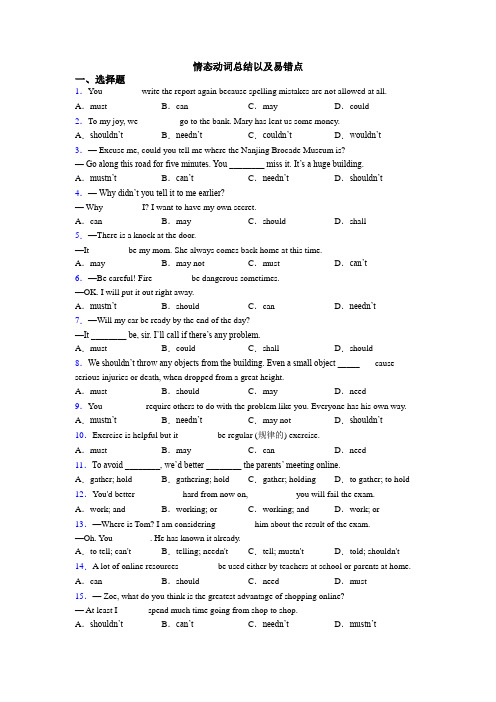
情态动词总结以及易错点一、选择题1.You ________ write the report again because spelling mistakes are not allowed at all. A.must B.can C.may D.could2.To my joy, we_________ go to the bank. Mary has lent us some money.A.shouldn’t B.needn’t C.couldn’t D.wouldn’t 3.— Excuse me, could you tell me where the Nanjing Brocade Museum is?—Go along this road for five minutes. You ________ miss it. It’s a huge building. A.mustn’t B.can’t C.needn’t D.shouldn’t 4.—Why didn’t you tell it to me earlier?— Why ________ I? I want to have my own secret.A.can B.may C.should D.shall 5.—There is a knock at the door.—It ________ be my mom. She always comes back home at this time.A.may B.may not C.must D.can’t6.—Be careful! Fire ________ be dangerous sometimes.—OK. I will put it out right away.A.mustn’t B.should C.can D.needn’t 7.—Will my car be ready by the end of the day?—It ________ be, sir. I’ll call if there’s any problem.A.must B.could C.shall D.should8.We shouldn’t throw any objects from the building. Even a small object ________ cause serious injuries or death, when dropped from a great height.A.must B.should C.may D.need9.You ________ require others to do with the problem like you. Everyone has his own way. A.mustn’t B.needn’t C.may not D.shouldn’t 10.Exercise is helpful but it ________ be regular (规律的) exercise.A.must B.may C.can D.need11.To avoid ________, we’d better ________ the parents’ meeting online.A.gather; hold B.gathering; hold C.gather; holding D.to gather; to hold 12.You'd better __________ hard from now on, __________ you will fail the exam. A.work; and B.working; or C.working; and D.work; or 13.—Where is Tom? I am considering ________ him about the result of the exam.—Oh. You ________. He has known it already.A.to tell; can't B.telling; needn't C.tell; mustn't D.told; shouldn't 14.A lot of online resources ________ be used either by teachers at school or parents at home. A.can B.should C.need D.must15.— Zoe, what do you think is the greatest advantage of shopping online?— At least I ______ spend much time going from shop to shop.A.shouldn’t B.can’t C.needn’t D.mustn’t16.—The high school entrance examination is coming!—Yes, our teacher tells us we _______ be too careful while taking exams.A.mustn't B.shouldn't C.needn't D.can't17.You ______ pay too much attention to your pronunciation, as it is so important in the oral (口头的) test.A.shouldn’t B.mustn’t C.can’t D.needn’t 18.—Ready? Let’s get started, Martin.— Swimming? I just ________ get used to it in winter.A.can’t B.needn’t C.mustn’t D.shouldn’t 19.Don’t cross the road until the traffic lights turn green. A car_______hit you.A.need B.may C.should D.must20.— Is Lang Lang going to perform at Art Center this Friday?— Yes. It ________ be him. He has been here for three days.A.might B.must C.mustn’t D.may21.— The sandstorm in Beijing is so serious this year.— Yes, I wonder when we ________ worry about the air we breathe.A.can’t B.mustn’t C.needn’t D.shouldn’t 22.—Must I finish all my homework today, Mum?—No, you ________, my dear. You can finish some tomorrow if you like.A.needn’t B.shouldn’t C.can’t D.mustn’t23.Most young people like shopping online because they ________ spend much time going from shop to shop.A.needn’t B.can’t C.mustn’t D.shouldn’t 24.—Is it usually warm in Yancheng in May?—Yes. But it _______ be rather cold sometimes.A.must B.should C.would D.can25.— Is the boy over there Tom? He often wears a jacket like that.— It _______ be him. He is absent from school today.A.needn’t B.shouldn’t C.mustn’t D.can’t26.You ________ pay too much attention to protecting yourself if you plan to go abroad. A.mustn’t B.can’t C.shouldn’t D.needn’t 27.When people are waiting at the zebra crossing, cars and buses ________ wait and let them go first.A.must B.may C.can D.need28.Look at the floor, Tom! ________ you watch TV while having a meal?A.Should B.Could C.Must D.May29.—I must go to school today, ________?—No, you ________.You can go as soon as you get well.A.mustn’t I;needn’t B.needn’t I;needn’tC.mustn’t I;mustn’t D.needn’t I;mustn’t30.Mr. Black ________ be at home now. He went abroad on vacation last Friday.A.can’t B.mustn’t C.needn’t D.shouldn’t 31.—What is that young lady’s job?—She ________ be a nurse, I’m not sure.A.must B.may C.need D.would32.—The article says that a perso n’s animal sign decides his personality.—You ________ read it for fun, but don’t believe in that.A.can B.must C.shouldn’t D.needn’t 33.—How beautiful the winter jasmines (迎春花) are!—Yes. These golden-yellow flowers ________ be widely seen in my city in March.A.must B.can C.would D.should 34.—May I have some wine to drink?—No, you ________. You have to drive home later.A.mustn’t B.needn’t C.can’t D.may not35.We teenagers ________ have dreams. With dreams and hard work, anything amazing________ be created.A.may; can B.might; should C.should; can D.must; has to 36.—Who’s singing next door? Is it Miss Wang?—It ________ be her. She’s having the board meeting.A.can’t B.shouldn’t C.mustn’t D.needn’t 37.Sorry, smoking is not allowed here. If you ________ , you will be fined according to the rules. A.can B.will C.may D.must38.—Is it really necessary for me to go shopping with a mask on?—I’m afraid you ________ in public. It is not only to protect yourself but also to protect others. A.must B.should C.can D.need39.—Who is singing next door? It sounds like a young girl’s voice.—It _________ be Jane. But she seldom sings English songs.A.need B.must C.may D.can 40.Sometimes smiles ________ be false, hiding other feelings like anger, fear or worry. A.should B.would C.must D.can【参考答案】一、选择题1.A解析:A【详解】句意:你必须重新写报告,因为根本不允许有拼写错误。
高考情态动词易错易混点

高考情态动词易错易混点一、单项选择情态动词1.I’m sorry, but you _____ go wrong. There’s no such man here.A.need B.can C.must D.will【答案】C【解析】【详解】考查情态动词。
句意:很抱歉,但是你一定是弄错了。
这儿没有这么个人。
A. need需要;B. can能够;C. must必须;D. will将会。
must指有把握的推测,“一定;必定”,结合下文There’s no such man here.可知一定是弄错了。
故选C。
2.Mr. Baker, some students want to see you. ______ they wait here or outside?A.May B.Should C.Shall D.Will【答案】C【解析】【详解】考查Shall的用法。
句意:贝克先生,有些学生想见你。
他们是在这里等还是在外面等?Shall用于第一、第三人称疑问句中,表示说话人征求对方的意见或向对方请示。
故选C。
【点睛】Shall的用法Shall作为助动词,一般用于第一人称Ⅰ和We,表示一个将来的动作,构成将来时态。
Shall后面接动词原形。
例如:(1)I shall think it over and Let you know my idea.我将考虑一下此事,然后告诉你我的想法。
(2)We shall have a good time in the park.我们在公园里会玩得很高兴的。
常考的特殊用法1. Shall用于第一人称,表示征求对方的意愿。
如:What shall we do this evening?2. Shall用于第一、第三人称疑问句中,表示说话人征求对方的意见或向对方请示。
如:Shall we begin our lesson?When shall he be able to leave the hospital?3. Shall用于第二、第三人称,表示说话人给对方命令、警告、允诺或威胁。
【易错考点回顾】情态动词can和could

【易错考点回顾】情态动词can和could【易错点睛】1. 表示能力He could swim when he was five. 他五岁时就会游泳了。
—Can you drive a car? 你会开车吗?—Yes, I can. 我会。
/No, I can’t. 我不会。
2. 表示推测Today is Sunday. He can’t be at school. 今天是星期天。
他不可能在学校里。
3. 表示允许You can use my bike this time. 这次你可以使用我的自行车。
You can’t take the book out of the room. 你不可以将这本书拿出室外。
4. 表示请求Can I go swimming today, please, mum? 妈妈,我今天可以去游泳吗?Could you tell me how I can get to the railway station? 请告诉我去火车站怎么走好吗?【典型错题】He _____ speak English very well although he has studied it for only one year.A. mustn’tB. can’tC. mustD. can【错因分析】本题的关键是对语境的理解,如果不理解although引导的让步状语从句的意思,就会影响能否正确判断空格处所缺情态动词的意思。
其次,学生还容易混淆must与can的用法区别。
【思路点拨】首先要理解题干中句子的意思,然后弄清楚四个选项中情态动词的用法,再结合句意判断空格处要表达的是“能,会”的意思,对比选项得出正确答案。
【正确答案】正确答案为D。
句意:尽管他学英语仅仅一年的时间,但是他讲英语很好。
A. mustn’t禁止;B. can’t不能;C. must一定;D. c an能,会。
根据althoughhe has studied it for only one year可知选D。
- 1、下载文档前请自行甄别文档内容的完整性,平台不提供额外的编辑、内容补充、找答案等附加服务。
- 2、"仅部分预览"的文档,不可在线预览部分如存在完整性等问题,可反馈申请退款(可完整预览的文档不适用该条件!)。
- 3、如文档侵犯您的权益,请联系客服反馈,我们会尽快为您处理(人工客服工作时间:9:00-18:30)。
【解析】
【详解】
【详解】
考查情态动词。句意:所有学生们应在去学校之前带上口罩以防感染非典病毒,这已经被宣布。shall用于第二、第三人称,表示说话人给对方命令、警告、允诺或威胁,故选A项。
10.Mark ______ have hurried. After driving at top speed, he arrived half an hour early.
A.needn’tB.wouldn’tC.mustn’tD.couldn’t
【答案】A
【解析】
考查情态动词。need’t have done本不必要做某事,句意:迈克本不必要着急的。他以全速驾驶后,他早到了半个小时。wouldn’t不会,mustn’t禁止,couldn’t不可能,所以选A。
I guess the poet would have been about twenty when she wrote her first poem.
Another worker wouldn't have acted like that.
4.One of our rules is that every student _______ wear school uniform while at school.
He oughtn't to / shouldn't have done that.他本来就不该做那件事.(可是做了)
6.“would+have+过去分词”表示对过去的某种情况进行猜测,或本来要做某事却因某种原因未做成,通常用来说明某一情况,但不像用should或ought to那样含有责备之意。如:
5.“should / ought to + have +过去分词”表示过去本该做某事但没做,其否定式表示过去不该做某事但做了,这种句式含有不满或责备之意,ought to的语气比should强一些。如:
You ought to / should have studied harder.你本应该更努力学习的.(但没有)
7、should作为情态动词,可以用于下列虚拟语气句中:
(1)用在表示与将来事实相反的条件状语从句中,构成“ If …… should(do sth)……, …… would/ could/ might(do sth.)…… ”句式。
(2)用在suggest(propose), arrange, plan, decide, advise, order, demand, request, desire, insist等表示“建议”、“要求”、“命令”、“决定”、“安排”、“计划”、“主张”的动词后面接的宾语从句中。这里的should也可以省略。
A.mightB.could
C.shallD.will
【答案】C
【解析】
【详解】
考查情态动词辨析。句意:我们其中一条规则要求每个学生在校期间都要穿校服。shall可以表示“命令,警告,强制要求;允诺;法律,规定要做……”,结合句意可知C正确。
5.— Excuse me, do you mind if I open the window?
2、should作为情态动词,可以用在条件状语从句中,表示语气较强的假设,译作“万一”、“竟然”,这时也可将should置于从句之首,即将should放在主语前面,而省略从属连词if。例如:If you should fail to come, ask Mrs Chen to work in your place.(= Should you fail to come, ask Mrs Chen to work in your place.)
— Well, if you__________. I can put on more clothes.
A.canB.may
C.mustD.shall
【答案】C
【解析】
【详解】
考查情态动词。句意:-不好意思,我把窗户打开你介意吗?-好吧,如果你必须这么做的话。我可以多穿点衣服。A. can能够;B. may可能;C. must一定;必须;D. shall会;将。must表示偏要,必须要做的事情,故选C。
【点睛】
should的用法
1、should作为情态动词,通常用来表示现在或将来的责任或义务,译作“应该”、“应当”,这时它可以和ought to, be supposed to互换使用.例如:You should(= ought to)tell your mother about it at once.
Would you mind coming with us?你介意和我们一起吗?
比如本题,would表示婉转的请求,征求对方的意见,故选A。
8.No student ________ go out of school to have lunch without permission of the headteacher.
【解析】
【详解】
考查情态动词。句意:安说无论什么时候她父亲不高兴的时候,他就会出去买些东西,通常是一些又大又没用的东西。A. should应该;B. could能;C. would总是,愿意;D. might可能。此处表示过去经常习惯做某事,故选C。
3.The accident which left 15 people on board dead ________ if both the angry female passenger and the bus driver had kept calm.
6.It wasn’t right to me that such near neighborsnot know one another.
A.couldB.would
C.shouldD.might
【答案】C
【解析】
【详解】
考查情态动词。句意:对我来说,很不正常,如此近的邻居居然不认识。A. could可能,能够;B. would将;C. should竟然;D. might可能,也许。should作为情态动词,可以用来表示意外、惊喜或者在说话人看来是不可思议的,常常译为"竟会"、"居然",住的这么近的邻居居然不认识。表示意外,所以答案选C。
5、should作为情态动词,可以用来表示有较大可能实现的猜测、推论,通常译为“可能”、“总该……吧”,相当于be expected to。例如:They should be home by now, I think.我想现在他们总该到家了吧。
6、should作为情态动词,用在由so that, for fear that, lest引导的目的状语从句和in case(that)引导的条件状语从句中,有“能够”、“可能”、“会”之意。例如:They got up early so that they should(= could/ might)catch the first bus in time.
3.“may / might + have +过去分词”表示对已发生的动作或存在的状态进行不肯定的推测,might的语气比may弱一点。这种结构主要用于肯定句和否定句,疑问句改用can或could。如:They may not have known it beforehand.
4.“need + have +过去分词”表示过去做了不必做或不需要做的事情,或过去做某事纯属多余。如:I needn't have bought so much wine—only five people came.
本句中should作为情态动词,可以用来表示意外、惊喜或者在说话人看来是不可思议的,常常译为"竟会"、"居然",住的这么近的邻居居然不认识。表示意外,所以答案选C。
7.would可以表达过去常常做的事,过去习惯发生的动作:
Pirates would bury gold in a cave.海盗们常常把黄金藏在山洞中。
We would take a walk along the river.我们过去常常沿河散步。
3. would后接like、love、mind等动词,表示要求、邀请、希望或询问,此时不是说过去,而是对现在的询问:
Would you like to come to my party?你愿意来我的派对吗?
3、should作为情态动词,可以表示谦逊、客气、委婉之意,译为“可……”、“倒……”。例如:I should say that it would be better to try it again.
4、should作为情态动词,可以用来表示意外、惊喜或者在说话人看来是不可思议的.尤其在以why, who, how等开头的修辞疑问句或某些感叹句中常常译为“竟会”、“居然”。例如:How should I know it ?我怎么会知道这件事?
2.Ann said whenever her father was unhappy he ________ go out and buy something, usually something large and useless.
A.shouldB.could
C.wouldD.might
【答案】C
【点睛】
情态动词+ have done结构:
1.“must + have +过去分词”表示对过去发生的事情或状态进行推测,语气比较坚定,通常只用于肯定句。如:It must have rained last night,for the ground is wet.
2.“can / could + have +过去分词”表示对过去某种情况的怀疑或不确定。can和could一般用于否定句和疑问句,could的语气较can弱。如:He can't have finished the work so soon.
